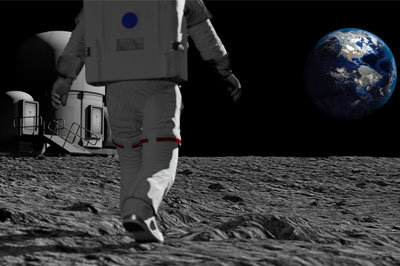Neil Armstrong, Buzz Aldrin, and Michael Collins became the most famous people on Earth four years before I was born. When I began kindergarten in 1979, the moon landing was still something to behold, even though 12 people had stepped onto its surface before the lunar missions ended in 1972.
As an 80s kid, my Star Wars fandom paired up with more space exploration by NASA. President Ronald Reagan, echoing JFK's call in 1962 to land a man on the moon, himself called for a permanently-crewed international space station. It was a time to dream big and aim high.
The Space Shuttle missions took center stage and to me, those astronauts were just as cool as Han Solo and Luke Skywalker. The latter were fictional. The former were living, breathing human beings working in the endless expanse of space.

I loved the space shuttle's resemblance to an actual ship, not a gangly spider like the original lunar landing. I could imagine us eventually building something that could zip around like an X-Wing fighter, even if my young mind didn't consider the scientific roadblocks to that.
It started to become routine, really, until the tragedy of the Challenger explosion on Jan. 28, 1986. My sixth-grade classroom would have joined others in seeing it unfold live had the schools of Centre, Alabama not been experiencing the rare snow day. I was outside playing when my mom called me in. Something had happened to the shuttle.
It was a strong reminder to the rest of us. The leap forward brings risk. To experience success, you must be willing to walk through defeat.
The last week has been a victory lap of congratulations for the 50th anniversary of the moon landing, as well it should be. But there was the strong possibility that wouldn't be the case. The riskiest part of the mission, it was agreed, came during the Eagle's relaunch into orbit. Should that not become possible for whatever reason, President Richard Nixon's never-delivered speech would have begun thusly:
Fate has ordained that the men who went to the moon to explore in peace will stay on the moon to rest in peace.
These brave men, Neil Armstrong and Edwin Aldrin, know that there is no hope for their recovery. But they also know that there is hope for mankind in their sacrifice.
These two men are laying down their lives in mankind’s most noble goal: the search for truth and understanding.
They will be mourned by their families and friends; they will be mourned by their nation; they will be mourned by the people of the world...
A time of exploration can be scary because of the risk of failure, but it can also be the impetus to something exciting, something unexplored.
Churches and associations are in a era where it makes sense to discover areas in need of ministry. That can be through building tiny homes for those fleeing an abusive situation. You can collect thousands of books for thousands of schoolchildren. It's even possible to raise money for missions by cycling, swimming, and running.
Georgia Baptists are good at developing ministries unique to their setting. Training, of course, is available through the Georgia Baptist Mission Board to help.
Every Christian, every church experiences failure at some point in trying to reach others with the gospel. Maybe it feels like those outweigh the successes, but don't discount the gains made even in failure. Perhaps that person didn't respond to your message or outreach, but the seed has been planted.
The important thing to remember is never give up.
When Challenger exploded, America went into mourning. President Reagan addressed the nation. For weeks the news recounted what led up to the tragedy. I'd never heard of an O-ring before then, but became very familiar with its importance and how it reacted to cold weather.
But two-and-a-half years later, Discovery blasted beyond the grasp of our atmosphere. There would be 86 more shuttle missions to follow until Columbia broke apart upon reentry on Jan. 16, 2003. After another two-and-a-half years, Discovery launched again in July 2005. That would be the first of 22 more successful missions before Atlantis launched and landed safely in the summer of 2011, bringing a close to the shuttle program.
I'm hoping that spirit of exploration, of pushing the envelope, can be reclaimed not just in our exploration of space but our churches. I'm confident it can be, because I'm seeing it.
I'm blessed to get to talk to many pastors and hear of their ministries. Yes, ministry is tough; tougher than many of them ever remember it. But it also reminds us of the world's need for the gospel. We have that message, and are finding new ways to present it.
The possibility of defeat can be scary, indeed. But for a world desperately needing Jesus, it's definitely a risk worth taking.